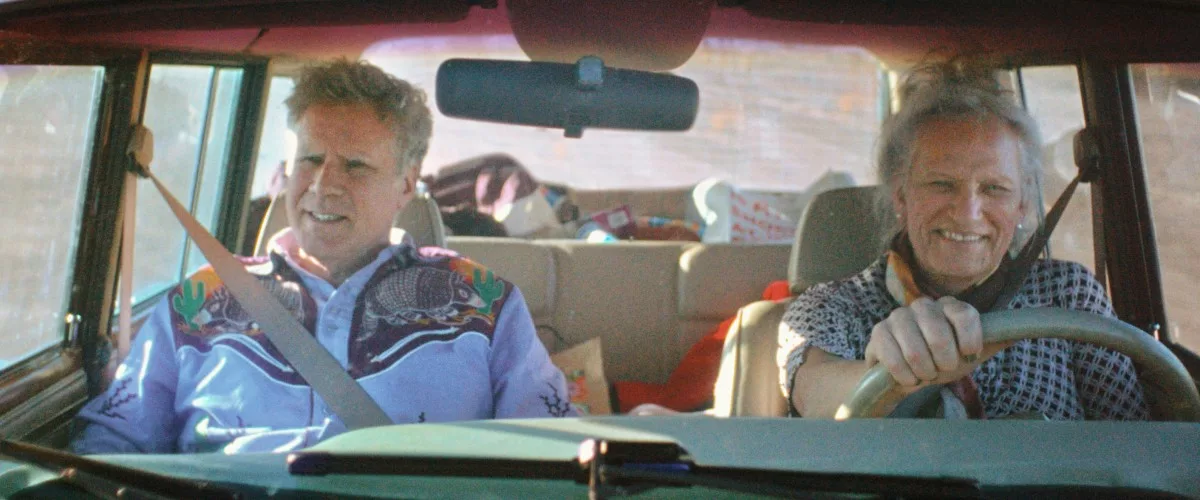
Real empathy—the kind that entails being big-hearted, curious about the world, and truly open to new perspectives—is in short supply these days. That’s why Will & Harper feels like such a small miracle.
One day, the comedian/actor Will Ferrell gets an email from his old friend, a former head writer for SNL and one of the first people to truly recognize Will’s talent. She explains that she’s transitioning and now goes by the name Harper Steele.
This is a bit of a shock to Will. For one, in her old life, Harper was something of a guy’s guy—a drinker of cheap beer, a fan of the open road, a curmudgeon. Also, she’s 61, which seems late in life to make such a big change. Will never saw this coming. But that’s because Harper hid her true self so well.
It’s Will’s idea that the two old friends should take a cross-country road trip to get reacquainted with each other. It’s important for Harper that Will meets the real her, a new person—still flawed, still scared but a better, more honest version of her old self. Nothing is off limits. Any questions can be asked. Yes, you can ask why it took so long. Yes, you can ask about her boobs. (Of course, Will will make a Nordstrom “Rack” joke.)
So the two friends climb into a Grand Wagoneer—the actual perfect car for a road trip—and set off.
This trip is meaningful for Harper in many ways. Back before she transitioned, she used to love road trips. Partly this was because she simply loved Americana—road stops, honkytonks, Wal-Marts. But also, we learn, because she would allow herself to wear a dress on the road—always with a pair of trousers in the back seat in case she was stopped by a cop or the like. And later, in one of the film’s more touching sequences, we discover that she bought herself an absolute shithole of a house—a stained mattress, graffiti on the walls, creaky floorboards—in the middle of nowhere. A place to hide. But also, what she thought she deserved.
So the road trip is allowing Harper to test the open road as her true self. Will is there as a buffer. Harper worries she won’t be accepted in her new gender, especially in places like Texas and Iowa, but Will is accepted everywhere.
At one point, they stop at a dive bar on the road and Harper asks Will to stay in the car. She’ll call him if she needs him. She wants to do this on her own—she needs to do this on her own. She walks into the bar—there’s a Confederate flag on the wall—and introduces herself to some locals. They start chatting. She calls Will: Come in and meet my new friends.
Will is such a goofy guy, and the two friends have such an easy rapport, cracking jokes and giving each other good-natured crap, that much of the trip has a loose, almost giddy feel. But while many are accepting of Harper, not all goes smoothly. They meet the governor of Indiana at a Pacers game, only to discover after the fact that he had signed an anti-trans bill into law. They go to an all-you-can-eat restaurant in Texas and are met with derisive stares (followed, inevitably, by cruel and transphobic tweets—thanks, Elon).
In both case, Will castigates himself. He should’ve taken better care of his friend. Harper assures him that what he’s doing for her is a gift.
I found Will’s openness to Harper almost unbearably moving. He compliments her—tells her she looks pretty. He is comfortable hugging her and crying in front of her. This is real masculinity, in my eyes. Men, take notes.
A few former and current SNL cast members show up: There’s a dinner in New York with Tina Fey, Seth Meyers, Tim Meadows, and others. Harper talks about how she no longer feels safe walking alone in an alley.
“Welcome,” says Fey.
“Does it ever feel safe to walk alone in an alley?” Meadows cracks.
They go for a hot air balloon ride with Will Forte, who says he’s honored to be part of their journey, and there’s a funny bit with an anticlimactic champagne popping.
They call Kristen Wiig and ask her to write a theme song for their trip. It needs to be jazzy, upbeat, with elements of country, and it should also make you cry. She has two days.
The film, of course, ends with Wiig’s creation, “Will and Harper Go West,” which is as funny and delightful a ditty as you might hope. (And yes, it made me cry.)
Oh, how I wish the transphobes of this world could watch this film and see how wonderful empathy is. It costs nothing. It broadens one’s understanding of the world and the humans who populate it. And it makes everyone feel good.
